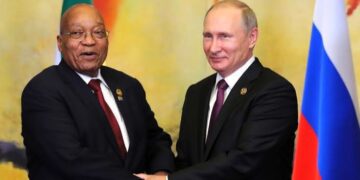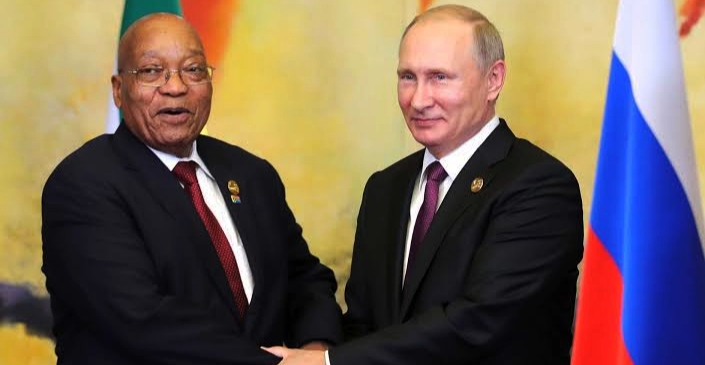By Lucy Adautin
The Democratic Alliance (DA), an opposition party in South Africa, has claimed that the former president Jacob Zuma’s uMkhonto weSizwe (MK) party has received campaign funding from Moscow.
The MK party’s impressive electoral debut has significantly impacted the nation’s political landscape.
In an interview with the Financial Times, DA leader John Steenhuisen stated that Zuma’s party, established just six months ago, had ample financial resources from the beginning.
According to Steenhuisen, the funding was evident from the first voter registration drive in January, only a few weeks after the party’s inception.
“I’m certain that money has flown into their accounts from Russia,” said Steenhuisen, adding that the MK party had gazebos, branded clothing and other costly electoral supplies from the first day of its campaign. “This is not some mom and pop organisation. I definitely think there is Russian money,” he said, though he conceded there was no proof.
Nhlamulo Ndhlela, MK party spokesperson, was adamant it had received no funding or support from Russia.
“President Zuma and President [Vladimir] Putin have enjoyed a relationship that goes back 40 years. They’re friends. But that’s not the same as the Russian government supporting the MK party,” he said.
READ ALSO: After Electoral Loss, Ramaphosa Says Unity Govt Best For S/Africa
Regarding Steenhuisen’s allegation, Ndhlela claimed that the DA leader aimed to divert attention from MK’s assertion that “the west” had a hand in manipulating the South African election. He mentioned that MK would provide more details on this accusation when it files court papers to challenge the election results soon.
Unlike other major parties in the election, MK has not reported its donations to the Electoral Commission of South Africa (IEC). All political parties are required to declare donations exceeding R100,000 ($5,300).
Sy Mamabolo, the IEC chief electoral officer acknowledged concerns about the source of MK’s funding but noted that no formal investigation had been initiated. “They haven’t made any declarations,” he told the FT. “We are bound by the legal framework, which means we cannot investigate unless there is an official complaint or an auditor flags it, neither of which has occurred.”
Herman Mashaba, leader of the ActionSA party, also questioned the origins of MK’s funding. “The MK party spent lavishly in this election, yet they have made no declarations to the IEC. This doesn’t make sense. There has been plenty of talk about the source, but we lack concrete evidence, and they need to explain.”
Zuma, whose party secured nearly 15 percent of the vote, has openly maintained close ties with Putin and a long-standing connection with Russia. During the late 1970s, as part of the ANC’s armed wing, also named MK, Zuma underwent military training in the Soviet Union.
Social media accounts on X that previously promoted Russian narratives switched to supporting Zuma’s party during the election campaign, according to the London-based Centre for Information Resilience.
Duduzile Sambudla-Zuma, one of Zuma’s daughters and a significant figure in MK, has described Putin as “Africa’s saviour.” She was noted as the “main amplifier of the #IStandwithPutin trend in South African communities on Twitter,” according to a CIR report last year.
Under Zuma’s presidency from 2009-2018, South Africa joined the BRICS bloc along with Brazil, Russia, India, and China. Zuma also advocated for a nuclear deal with Russia that independent experts deemed financially disastrous for South Africa.
He signed a R1tn nuclear agreement with Russian state-owned Rosatom to build nuclear power plants. A South African court later ruled the deal illegal as Zuma had bypassed parliamentary approval. The Zondo commission of inquiry into state capture found that Zuma had dismissed his finance minister for opposing the deal.
MK’s manifesto includes plans to revive a nuclear program and expresses solidarity with Russia, Cuba, and Palestine against western imperialist forces. Zuma has also endorsed Russia’s full-scale invasion of Ukraine, calling Putin a “man of peace” provoked by NATO expansion.
Mmusi Maimane, leader of the Build One South Africa party, also questioned MK’s funding sources. “Someone has funded MK. They ran a campaign worth several hundred million rand,” he said, noting that MK significantly outspent more established parties. “They have a very sophisticated electoral machine.”




































